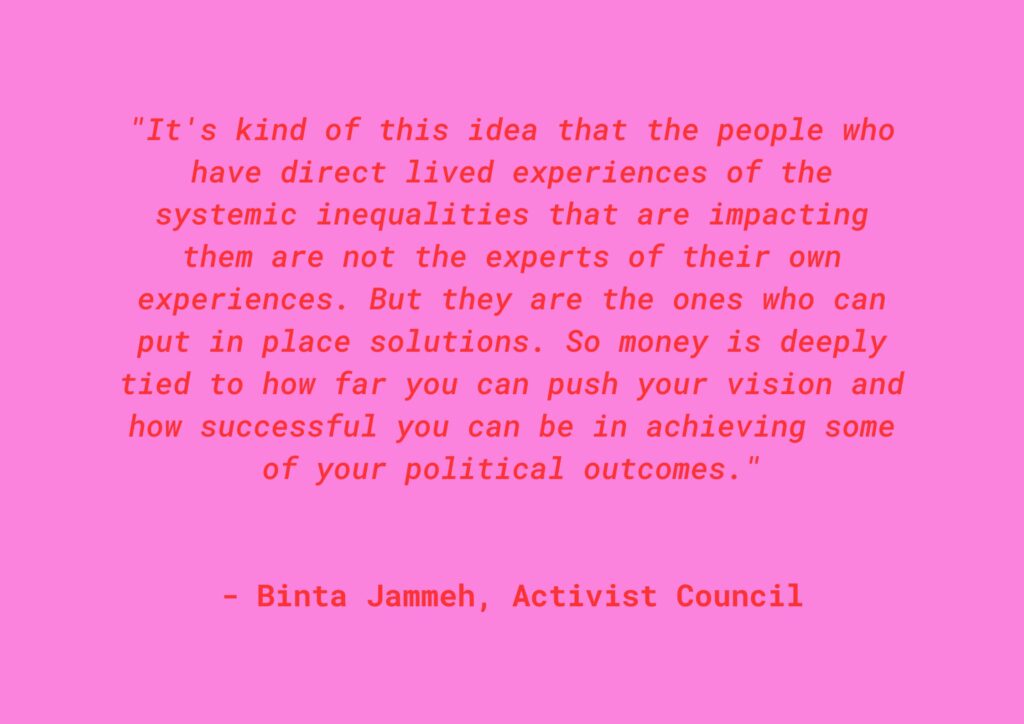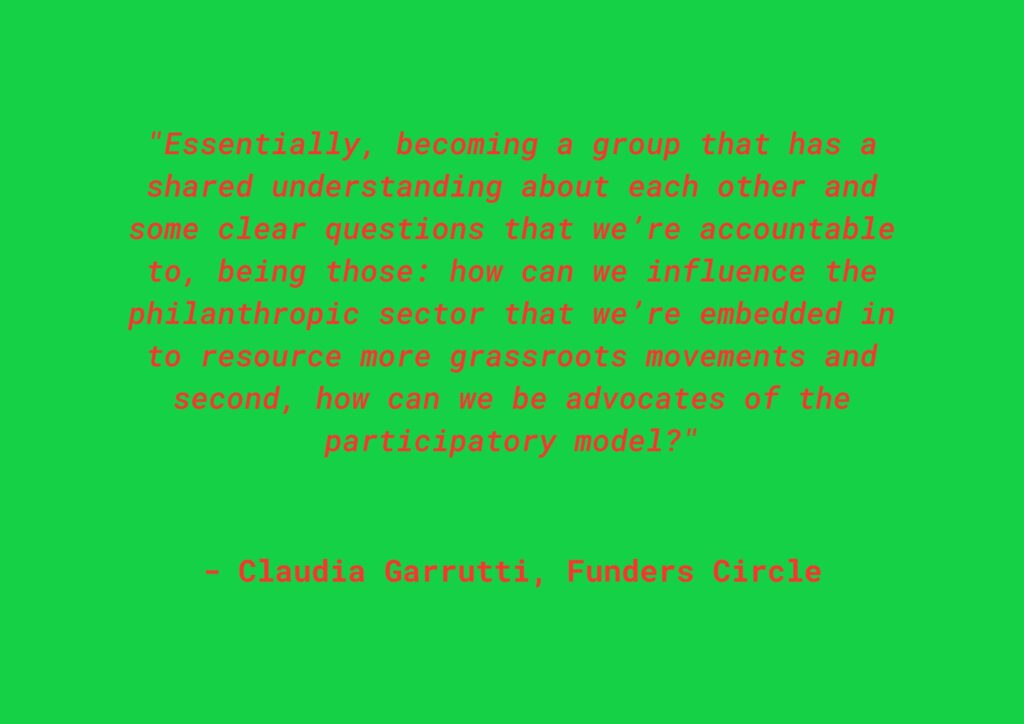About a month ago, Binta (BJ), Claudia (CG) and Teresa (TM), each a member of one of governance bodies of the Guerrilla Foundation, chatted about the organisation’s governance transition that started in April 2021. The conversation touched on some of the inner workings of each new group – the Activist Council and the Funders Circle – and their member’s thoughts on changing the wider charitable-industrial complex that Guerrilla affects into a field where funding grassroots movements is key, embracing the much needed accountability and reparations work that is often lacking in philanthropy.

You’ve been part of our collectivised resourcing and participatory grantmaking experiment for about a year now, how do you feel about it so far?
BJ: In the beginning, to be really honest, I had my guard up towards this experiment, but over time I feel I’ve really been pleasantly surprised. For me, being part of this participatory grantmaking experiment has made me realise that I enjoy being on the side of the funder and using our expertise as people who do the grassroots work and who come from these communities. So helping funders understand how they can best support these groups, and in return redistribute in a way that is equitable, that is just and that aligns with the grassroots vision we have. Particularly in the case of the work that I do, it’s been not an easy journey to find funders who are that open and willing to understand the activists but from the activist point of view. So being part of this experiment has shown that there is a way forward and there’s a different way of trying to fund grassroots movements, which I like. Besides, it’s been really nice for me as well to get to know the other members on the council, being able to understand different movements means being able to put intersectionality in action. This has made me think about how I can do my own work as an activist and how we can continue to fund and support grassroots movements in a more rich way. All in all, it’s nice to have the freedom and support of Guerrilla to do this wacky experiment together. Let’s see how far we want to push it, we still have a long way to go.
CG: I think my answer is relatable in the sense that it’s definitely a journey of growth. Thinking back of our first meeting, people didn’t know each other so we had to ask ourselves essential questions like who we are, what we do, and why are we here together? It’s not so easy to form a group and at the same time, to have already a new vision of what philanthropy and participatory philanthropy could be. We also had the luck of having some funders who had been very close to Guerrilla over the past years, and that was a very good way to let the spirit spread in our meetings, but also to learn how to better interact with Guerrilla at large. Not even one year later, we have some clear ideas, not many solutions, but clear questions about what our role should be, and what is it that we’re doing. Besides, having nine people who have different perspectives, as funders and as people, for me, it’s huge. It’s an opportunity to learn from each other, and then to form as a group, and take decisions together. We’re figuring out what means bringing future members in, what means giving more money or providing other types of resources to the ecosystem. So these are ongoing questions and it’s been really nice to see that Guerrilla can be a platform to explore them, while creating more trust with one another.
What were your motivations for joining the Guerrilla FC/AC?
BJ: I am the treasurer at my organisation, Lallab (France), so money is something that I’m always thinking about in terms of how we fund our actions in an equitable and sustainable way. Besides the skill-set perspective, I was also intrigued about how it was difficult for people who were directly related to the issues that they were fighting for, to receive funding for the work that they were doing. And this was something that drove me up a wall. Because it’s kind of this idea that the people who have direct lived experiences of the systemic inequalities that are impacting them are not the experts of their own experiences. But they are the ones who can put in place solutions. So money is deeply tied to how far you can push your vision and how successful you can be in achieving some of your political outcomes. Seeing that it was more difficult for us to receive funding, it really made me want to understand from a funders’ perspective, how is it that you fund these movements? And what is it that you’re looking for? And what is it that you’re focusing on, particularly when it’s a funder who says they adhere to certain values?
CG: A few years back, I read an interview from Toni in Alliance Magazine. I was already doing work that supported campaigning and advocacy work, but when I read the interview, I was glad to know there is someone thinking about radical philanthropy! That’s how I got to EDGE Funders Alliance and later to Romy. When I was asked to join the Funders Circle, I think it was the right time for me because I had just started to think of what being a funder meant. I’m very, very far away from having answered all the questions, and hopefully will never fully answer them, if not to become static and not reactive to change. I might’ve been slightly naive when accepting the invitation without fully knowing exactly what it would entail, but I did feel the bravery of jumping and seeing if we can create something new. So I approached my start in the FC with humbleness, realising that my peers were much “ahead” of me in the way they’re thinking, in the way they’re redistributing… At the same time, my motivations were also really tied with funding the right movements because, and we’ve seen this, it’s very hard to support grassroots movements without actual embeddedness in the ecosystem. How do you find them? It’s not always so easy. So of course, there was also the motivation of knowing that through the GF this money is very well spent. I don’t have to worry about it because it’s aligned with my strategy. This level was crucial, and is already another learning journey.

I must say for us at the GF it was also very important to reflect on our embeddedness in the ecosystem. Growing the organisation to a body that has much more in-depth knowledge about the groups we resource really allowed us to better understand the ecosystem we are connected to.
BJ: I think that’s why for me, at the heart of this work is relationship building from a community organising standpoint. It’s all well and good to have the financial resources, but even before you can get to that, is understanding – how do I build a relationship before we even talk about the funding? How do I truly understand who this group is, and how they function and how they’re operating and what their difficulties are, and their vision for the alternative spaces that they’re trying to create? That relational aspect is missing, it makes it harder for people to come off their defences or to even trust that it’s a genuine relationship or a genuine desire to help. So everything starts and ends with just the relationship and investing the time to really get to know how groups function and how they work.
On another level in the FC, I know that individuals are also in different journeys when it comes to relationships, even with respect to their own wealth. How does that factor into the dynamics of the FC group?
CG: I think there is great respect for everyone’s individual journeys and openness to learn from each other about where they are at in “coming out” about their wealth. I learned to nourish this through our get-togethers. It makes us work from humbleness, and for me this is a very good basis that will allow us now to better define how far we can go on with this experiment and what the collective role is when it comes to such questions, especially considering that more people will join our group in the future.
We tapped into different learning journeys here, do you want to add anything in regards to the inner workings of your groups?
CG: Essentially, becoming a group that has a shared understanding about each other and some clear questions that we’re accountable to, being those: how can we influence the philanthropic sector that we’re embedded in to resource more grassroots movements and second, how can we be advocates of the participatory model? So that means not reaching out to others about joining Guerrilla as funders, but being an ambassador of the model that’s being tested here.
BJ: I feel aligned with Claudia, particularly on the power of this experiment to influence the sector. How can this structure go from being a small niche experiment to the standard of how philanthropy functions, particularly when it comes to supporting grassroots movements? That would be the dream. At the moment we’re learning, growing, changing and adapting and pulling in a lot of different directions. Some of my learnings relate to very practical questions too, like reviewing grant applications and learning from more experienced AC members on a given group or theme. It makes me have a more nuanced understanding of issues that perhaps I had a baseline knowledge of. Besides, there’s also the part where I’m widening myself outside of my own ecosystem. The rootedness in our work is great, but having a bird eye view on the wider ecosystem makes me realise how other groups in Europe share our values or encounter the same struggles that we do. That not only makes us feel less alone, but also opens up to create synergies and allyship.

What else has been positive about being part of the FC/AC?
BJ: Within the AC, we have some working groups that look at some specific organisational issues. In my group we focus on decolonisation & care, asking ourselves the question: what does it mean to be deeply rooted in anti-oppression? And what does that look like? And how do we think about our power? Then there’s the component of building a deep culture of care, of reciprocity & love in the support of activist groups. But to do all this, we realised it’s really important to meet in person, given the lack of existing relationships within the group. Some of these conversations are difficult and messy, and we need intimacy to unwind them together.
CG: If I can connect to my experience in the FC, I can also see how important it is to meet in person. When the FC was formed, there was much of an “individual identity” present, different people representing different fields and viewpoints – our egos were present. To do this work of stepping back and understanding which power we hold requires connection and trust, and this is where we need a shared space, a physical meeting. That ultimately is the glue to become a group.
This also blends in well with the next question I had. What has been more challenging for you in this experiment in the FC?
CG: After having identified my personal questions and after forming collective ones alongside the other FC members, I wonder how we can take it further? Meeting in person and having more contact with each other can help there. Besides, there’s the challenge of maintaining multiple voices within the group while also developing a unified vision that will influence the sector. It’s a balance, but I’m more mindful of that now after a year in this experiment and understanding the diversity of members in our FC. Personally, I also still grapple with themes like power redistribution & privilege. I’m also here because I need some ass kicking on this! If I want to become an ambassador for funding grassroots movements, I need to be able to have those difficult conversations, and in that sense be accountable. In fact in the FC, we need to hold each other accountable if we want to form a common vision for radphil.
BJ: This is a refreshing perspective, and also a really helpful one since a lot of this work comes especially from unlearning things that are rooted in us. It’s a journey, it takes time, also for us as activists when understanding things like intersectionality for example. I think a lot of us in the AC would be keen to have those discussions with the funders as well.

Where do you feel this collective can grow? What should it grow into?
BJ: Well.. we don’t necessarily know what the end point is, and that’s not a bad thing. So what guides us to the future is paved by the analysis we do of our work, asking the difficult questions and making sure that it’s aligned with where we want to go. It can be thinking about how we can be more radical, but especially more accountable to the way that we’re doing our work. If we’re not living up to the values and expectations we had for ourselves, then finding a way to shift that, taking accountability and moving forward.
CG: The ambition is, I think, to keep shaping what this experiment is in terms of learning from each other, defining accountability mechanisms, and what is our responsibility towards the sector. Besides, building relationships outside of the silos! That will enable us to tap into the difficult questions we spoke about earlier, which is an essential part of doing this work.
Finishing off with something more aspirational: any last reflections on the relevance of this trial for changing and ultimately abolishing philanthrocapitalism?
CG: I would aim at shaking it very strongly! I’d say let’s provide a valuable example that shows it is possible. Let’s aspire to be the best possible model, but let’s allow others to be shaken by taking the little bit they need to develop their journeys and start to think what philanthropy could look like, what the role of funders should be, and how one could easily practise the talk by redistributing in a different way. So my aspiration is to have in our hands something we can say, hey, you don’t have to do it all tomorrow, but it works.
BJ: Guerrilla alone cannot abolish the system as it is, no one group alone can in fact. Ultimately my aspiration is that the system is transformed. Today philanthropy only exists this way because of capitalism, so if we’re saying that we want to reform the way in which this functions and the way in which the system is supporting grassroots activists, it’s almost like a new system has to take its place. What Guerrilla is doing is trying to create an alternative system that sheds light into new ways of doing things. That’s a system where those who are doing the groundwork and have direct experience of the issues they’re working on should be benefiting from that redistribution of wealth so that they can try and recreate or challenge the system that has marginalized them for so long, and this way create the alternative cultures that will power the future. Hopefully in 10, 15, 20 years from now a completely new functioning way of funding will exist that is not dependent on the old paradigm. Whether or not we’ll get there, we’ll see. But I’m glad that we’re here and we’re trying to do that together because we show it’s possible.




